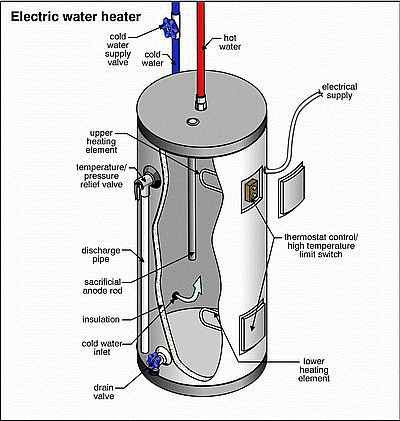Water Heater, How It Works
Purchasing:
Picking out the correct heater for a residential application can be tricky. It's best that you purchase a water heater from a professional plumber. Aetna Plumbing has been in business since 1972 and they have the knowledge and experience to help help you choose the correct water heater for almost any water type. Well water, city water, hard water and soft water.
Installation:
A Professional installation is the best choice for getting the job done right the first time. Some people do not realize that after purchasing a water heater you should never lay it on its side. Depending on the manufacture and type it could be harmful to the unit and cause perminant damage. Aetna Plumbing will transport your new water heater to the job site, safely install the new one. Then, remove your old water heater and dispose of it properly.
Parts and Functions:
Hot Water comes off the top and cold water comes in from the bottom.
Relief Valve - Top valve, if too much pressure builds up, the relief valve will release the pressure in the tank to help prevent it from exploding.
Anode Rod - this rod is known as the sacrificial rod and it is used to attract the impurities in the water, which in turn help protect the inner linning of the tank.
Dip Tube - tube inside the heater that directs the water from the bottom to the top of the tank.
Thermostat - maintains temperature of the water and transfers power to the element.
Elements - heat the water in the tank.
Drain - used to drain water form the tank.
Thermal Expansion Tank - Safely controls thermal expansion by accepting the expanded water and keeping the system pressure safely under the relief valve setting

Hot Water Heater Residential: Tank GAS
Except for: Thermostats, Gas Valve, Burners, Flu, Power Vent & Elements a gas heater is very similar to an electric heater.
Do’s and Dont’s for Residential Hot Water Heaters
DO:
- • Set temperature below 120°F
- • Yearly drain hot water heater , removes sediment build-up
- • Yearly test safety relief valve
- • Set temperature to lowest setting while away
- • Follow recommended maintenance schedule
DON’T:
- • Set temperature above 120°F
- • Allow combustible or flammable materials within 18” of water heater
- • Allow children to play near water heater
HELPFUL HINTS:
- • Water heaters should be sized to your home
- • Insulating helps save energy and money
- • Water temperatures above 120°F can scald
- • Hot water heaters require yearly maintenance
- • Sediment build-up can cause costly repairs and excess costs
